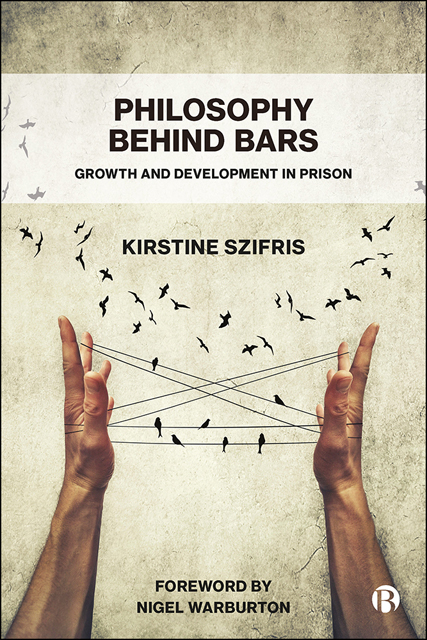Book contents
- Frontmatter
- Dedication
- Contents
- List of Boxes
- Acknowledgements
- Foreword
- 1 Philosophy, Identity and the ‘Ship of Theseus’
- 2 Towards Theory: People, Places and Voices
- 3 Survival, Plato and the Ideal Society
- 4 Kant, Bentham and the Question of Identity
- 5 ‘Why Do You Think That?’ Descartes, Hume and Knowledge>
- 6 Not Just an Offender, But a Person
- 7 Trying to Find a Community of Philosophical Inquiry
- 8 Finding Trust and Developing Relationships
- 9 Personal Self-Exploration
- 10 Towards a Framework for Understanding Philosophy in Prison
- 11 Final Reflections
- Appendix: Technical Methods
- Bibliography
- Index
5 - ‘Why Do You Think That?’ Descartes, Hume and Knowledge>
Published online by Cambridge University Press: 15 April 2023
- Frontmatter
- Dedication
- Contents
- List of Boxes
- Acknowledgements
- Foreword
- 1 Philosophy, Identity and the ‘Ship of Theseus’
- 2 Towards Theory: People, Places and Voices
- 3 Survival, Plato and the Ideal Society
- 4 Kant, Bentham and the Question of Identity
- 5 ‘Why Do You Think That?’ Descartes, Hume and Knowledge>
- 6 Not Just an Offender, But a Person
- 7 Trying to Find a Community of Philosophical Inquiry
- 8 Finding Trust and Developing Relationships
- 9 Personal Self-Exploration
- 10 Towards a Framework for Understanding Philosophy in Prison
- 11 Final Reflections
- Appendix: Technical Methods
- Bibliography
- Index
Summary
I began the discussion on knowledge by presenting a set of optical illusions. The participants looked at them eagerly, examining each one and marvelling at the way the illusion tricked the mind. I brought the conversation back by asking the participants, “How do you know what you know?”
This was the third week in HMP Grendon, and the participants had already grasped the expectations of the philosophy classroom. In both of the prison's groups they seemed to bounce into the classroom, full of energy and ready to talk. There was some fluidity to the groups because of the integration of the prisoners, with no separate VPU. This meant I allowed some to switch days every now and then to accommodate other commitments they had in the prison.
In one group, the conversation went straight to the point: “Well, this is about doubt, isn't it?” Michael had had a troubled route through the prison system and a complex backstory. By the time I met him, he was half-way through a degree relating to politics and economics. He was thoughtful, often insightful, and always engaged.
The rest of the group joined in. They discussed the need to be cynical, about whether you could trust your senses, and how you ever know if anything is real. Michael was not the odd one out with his level of education. Most were studying Open University courses, with one having gained a degree prior to coming to prison. One had read a far greater amount of philosophy than I had, including texts such as Plato's Republic, which he casually dropped into conversation during his pre-participation interview.
In the other group, the conversation was more boisterous, although no less discerning. One of the participant's responses was to knock on the table, saying “It's here. We know it's real because it's here.”
They followed this with a discussion about knowledge, with all participants chipping in with their thoughts. They interrogated the idea of facts and how we know something to be true. What do our senses tell us, and is it possible to trust our perceptions?
- Type
- Chapter
- Information
- Philosophy behind BarsGrowth and Development in Prison, pp. 75 - 98Publisher: Bristol University PressPrint publication year: 2021



